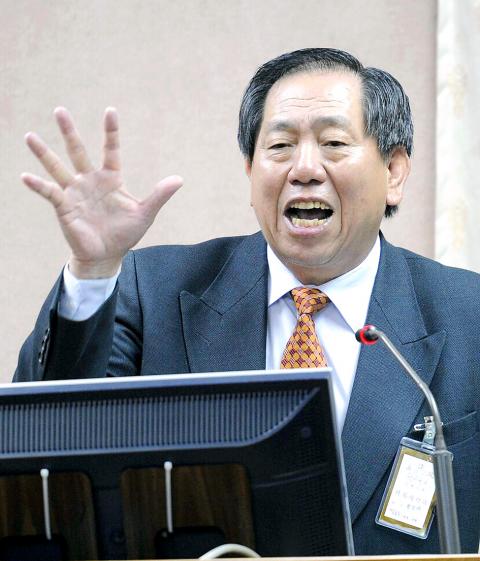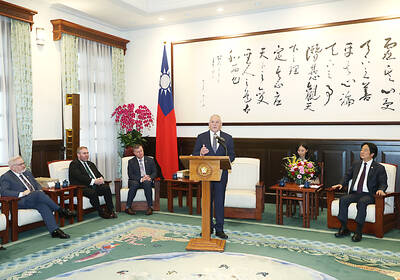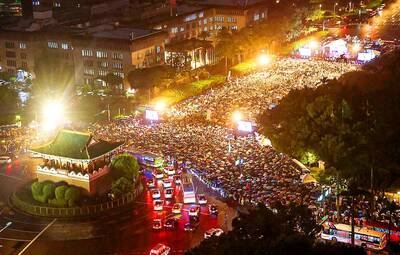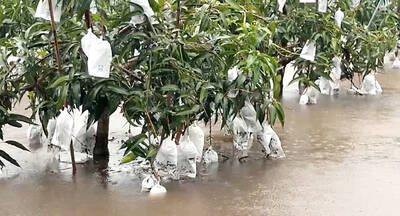The economy is a critical factor in the government’s management of cross-strait risk and crisis, according to National Security Bureau (NSB) Director-General Tsai Der-sheng (蔡得勝), but risk management has gone beyond traditional factors such as politics and the military in dealing with China.
Tsai, in an interview with the Central News Agency published yesterday, said that while President Ma Ying-jeou (馬英九) has been focusing on improving cross-strait relations, and while bilateral exchanges have increased substantively, an “overall security mechanism” is important for implementing the government’s China policy.
He said the cross-strait Economic Cooperation Framework Agreement (ECFA), a landmark pact signed in 2010, is an important indication of Taiwan’s confidence in opening up to China.

Photo: George Tsorng, Taipei Times
Any opening policy that is well-prepared and implemented under a comprehensive risk management plan will bring more benefit than harm to the country, Tsai said.
“Only by increasing exchanges and interaction with the mainland can we hope to improve mutual understanding and reduce the likelihood of misjudgements or miscalculations by either side,” he said.
Tsai tried to clear up a misunderstanding about the bureau’s alleged role in “putting the brakes on cross-strait policy.”
“Frankly,” he said, “during my 30-odd years in the NSB, I have rarely seen an incidence of the NSB voicing opposition to a government policy.”
The NSB just offers its analyses and suggestions for the reference of government leaders, helping them to become more informed about policy options that best serve national interests, Tsai said.
He expressed concern, though, that the increasingly frequent exchanges across the strait under the Ma administration could be creating possible risks.
The risks, according to Tsai, lie not in the management of personnel, commodity, financial or technological exchanges, but in the difficulty of forging a consensus among all sectors of society, as each individual involved has different interests related to China.
“Our problem is that things are changing so fast and everybody’s relations with the mainland have changed so much. Everyone is looking at cross-strait relations from his or her personal perspective,” he said.
A critical element in Tsai’s “overall security management” idea is to take advantage of China’s economic reform programs, since the economies of Taiwan and China are so closely intertwined.
“Reap what we can and avoid what is likely to damage us -economically,” he said. “This is what we must understand and gain full control over.”
Tsai suggested that all sectors of society, including the ruling and opposition parties, should discuss “what kind of open policy we want” and “what kind of relationship we would like to have with China.”
At least, there should be a consensus on an acceptable cut-off point at which damage is perceived to be increasing, he said.
Tsai also said that in the future, economic and social problems would pose the biggest threat to China because Beijing would be fighting an uphill battle against the Internet, given the rapid increase in its number of netizens, now estimated at about 500 million.
Although Tsai did not elaborate on what kind of challenges Beijing will face economically, but it accepted that a hard landing for China’s economy would result in massive unemployment and social instability.
Chinese Premier Wen Jiabao (溫家寶), in a report to the National People’s Congress several days ago, lowered the projection for China’s GDP growth this year to 7.5 percent.
Tsai also said that Chinese Vice President Xi Jinping (習近平), who is set to become China’s next leader, has the best understanding of Taiwan among the country’s top leadership.
Tsai said there would be “no risk” of political instability in the process of Xi’s takeover this autumn from Chinese President Hu Jintao (胡錦濤).
This is because Beijing has established a “leadership succession” mechanism through which a younger generation of leaders takes over from the preceding one. This is totally different from China’s past, when any new leader emerged only as the winner of a power struggle, he said.
A sound system that ensures good care is taken of retired leaders and allows their offspring — the so-called Taizidang (太子黨) or Princelings Party — to enjoy privileges in the business world, has also contributed to the reduced political risk in succession, Tsai added.
Xi, son of the late Chinese Vice Premier Xi Zhongxun (習仲勛), worked between 1985 and 2002 in Fujian Province, just across the Taiwan Strait, which gave him frequent contact with Taiwanese investors there.
However, Tsai said that “as one who understands Taiwan commore than his predecessors, what Xi Jinping will be doing toward Taiwan might fall short of Taiwanese expectations,” because “whoever is at China’s helm will not dare to compromise on such issues as sovereignty and territory — defined by China as one of its core interests.”

‘NON-RED’: Taiwan and Ireland should work together to foster a values-driven, democratic economic system, leveraging their complementary industries, Lai said President William Lai (賴清德) yesterday expressed hopes for closer ties between Taiwan and Ireland, and that both countries could collaborate to create a values-driven, democracy-centered economic system. He made the remarks while meeting with an Irish cross-party parliamentary delegation visiting Taiwan. The delegation, led by John McGuinness, deputy speaker of the Irish house of representatives, known as the Dail, includes Irish lawmakers Malcolm Byrne, Barry Ward, Ken O’Flynn and Teresa Costello. McGuinness, who chairs the Ireland-Taiwan Parliamentary Friendship Association, is a friend of Taiwan, and under his leadership, the association’s influence has grown over the past few years, Lai said. Ireland is

A saleswoman, surnamed Chen (陳), earlier this month was handed an 18-month prison term for embezzling more than 2,000 pairs of shoes while working at a department store in Tainan. The Tainan District Court convicted Chen of embezzlement in a ruling on July 7, sentencing her to prison for illegally profiting NT$7.32 million (US$248,929) at the expense of her employer. Chen was also given the opportunity to reach a financial settlement, but she declined. Chen was responsible for the sales counter of Nike shoes at Tainan’s Shinkong Mitsukoshi Zhongshan branch, where she had been employed since October 2019. She had previously worked

FINAL COUNTDOWN: About 50,000 attended a pro-recall rally yesterday, while the KMT and the TPP plan to rally against the recall votes today Democracy activists, together with arts and education representatives, yesterday organized a motorcade, while thousands gathered on Ketagalan Boulevard in Taipei in the evening in support of tomorrow’s recall votes. Recall votes for 24 Chinese Nationalist Party (KMT) lawmakers and suspended Hsinchu City mayor Ann Kao (高虹安) are to be held tomorrow, while recall votes for seven other KMT lawmakers are scheduled for Aug. 23. The afternoon motorcade was led by the Spring Breeze Culture and Arts Foundation, the Tyzen Hsiao Foundation and the Friends of Lee Teng-hui Association, and was joined by delegates from the Taiwan Statebuilding Party and the Taiwan Solidarity

TRANSPORT DISRUPTION: More than 100 ferry services were suspended due to rough seas and strong winds, and eight domestic flights were canceled, the ministry said Tropical Storm Wipha intensified slightly yesterday as it passed closest to Taiwan, dumping more than 200mm of rain in Hualien and Taitung counties, the Central Weather Administration (CWA) said. As of 11am, Wipha was about 210km southwest of Cape Oluanpi (鵝鑾鼻) and was moving west-northwest at 27km per hour (kph). The storm carried maximum sustained winds of 101kph and gusts reaching 126kph, with a 150km radius of strong winds, CWA data showed. Wipha’s outer rainbands began sweeping across Taiwan early yesterday, delivering steady rainfall in the east and scattered showers in other regions, forecasters said. More heavy rain was expected, especially in the eastern